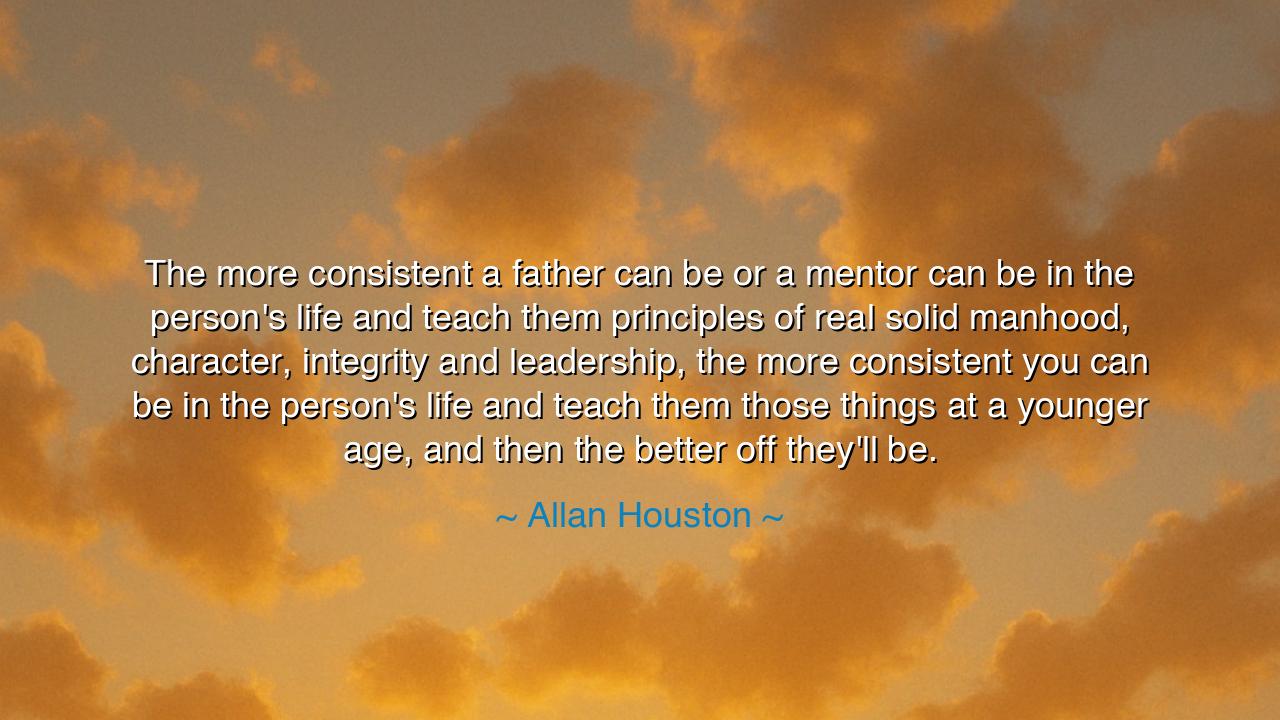
The more consistent a father can be or a mentor can be in the
The more consistent a father can be or a mentor can be in the person's life and teach them principles of real solid manhood, character, integrity and leadership, the more consistent you can be in the person's life and teach them those things at a younger age, and then the better off they'll be.






When Allan Houston, the renowned basketball player, philanthropist, and mentor, declared, “The more consistent a father can be or a mentor can be in the person's life and teach them principles of real solid manhood, character, integrity and leadership, the more consistent you can be in the person's life and teach them those things at a younger age, and then the better off they'll be,” he was speaking not merely as an athlete, but as a sage of experience. His words reach far beyond the court—they echo the eternal wisdom of generations who knew that the true measure of a man is not in his strength or skill, but in the character that shapes his soul and the integrity that guides his steps. In these words lies an ancient call: that fathers, mentors, and leaders must become the steady pillars upon which the next generation can rise.
To understand the origin of this truth, we must look to the life of Allan Houston himself. Born the son of a basketball coach, he was not merely trained in the art of sport, but in the deeper lessons of discipline, humility, and faith. His father, Wade Houston, was his first mentor—consistent, present, and unyielding in his values. From this foundation, Allan came to understand that greatness is not inherited; it is cultivated through example, through repetition, and through unwavering guidance. Thus, his words are not theoretical—they are the distilled wisdom of lived experience, passed down from father to son, and shared with the world as both legacy and law.
When Houston speaks of consistency, he names the quality that transforms influence into permanence. The consistent father or mentor becomes like the sun—rising every day, steady and sure, providing light even when unseen. For children and young men, this constancy is the soil in which virtue grows. Without it, the lessons of manhood and morality scatter like seeds upon the wind. A father who teaches once but vanishes leaves echoes, not roots. But a father who shows up, day after day, becomes the compass of the heart—the reminder that strength without virtue is hollow, and that manhood without principle is merely pride.
The principles Houston names—character, integrity, and leadership—are not modern inventions; they are the ancient pillars of all noble life. Character is the form of the soul, revealed not in words but in deeds. Integrity is the sacred bond between what one believes and what one does. Leadership is not the hunger for authority, but the willingness to serve and to guide others toward righteousness. When a young person is taught these truths early—through the consistent example of a mentor—they are like a tree planted beside the river: firm in adversity, fruitful in season, and steadfast in storm. The inconsistency of modern life—broken homes, absent fathers, distracted mentors—has made this teaching rare, yet it is more necessary now than ever before.
History itself bears witness to this eternal pattern. Consider the story of Alexander the Great and his mentor Aristotle. Before he conquered kingdoms, Alexander was taught to conquer himself—to seek wisdom, to temper power with virtue. Aristotle did not train him with lectures alone but with the constancy of a mentor who cared for both mind and soul. In time, Alexander’s greatness flowed not merely from his armies but from the discipline and vision instilled by consistent mentorship. Though his empire would crumble after his death, the ideals of learning, culture, and virtue he carried from his teacher would echo through ages. This is the power of steadfast guidance—the shaping of a life that shapes the world.
Allan Houston’s words also contain a quiet warning. Inconsistency in a mentor breeds uncertainty in the pupil. A father who is present one day and absent the next teaches chaos, not order. A leader who speaks of virtue but lives in hypocrisy teaches deceit, not character. Therefore, those who would guide others must first master themselves. Consistency is born of conviction, and conviction is born of purpose. The mentor who would shape others must live the truth he would teach—patiently, faithfully, without wavering. As the ancients said, “The lamp that lights another must not go out.”
Let the lesson of Houston’s wisdom, then, be this: that every man and woman has within them the power to be a mentor, a stabilizing force in a world of uncertainty. Whether to a child, a student, or a friend, your consistency becomes the seed of their strength. Teach not through grand speeches, but through steady action. Let your word and your way be one. Build character by choosing honesty when it costs you something. Model integrity by keeping your promises, even when unseen. Lead not with dominance, but with example. For every child who witnesses such constancy will grow to carry it forward, extending its light into generations yet unborn.
Thus, in the enduring spirit of Allan Houston’s message, remember: greatness is not in trophies or fame, but in the legacy of virtue passed from one soul to another. Be the steady hand that guides, the voice that uplifts, the presence that never falters. For when you are consistent in love, discipline, and truth, you do not merely raise children—you raise foundations upon which the future itself will stand.






AAdministratorAdministrator
Welcome, honored guests. Please leave a comment, we will respond soon